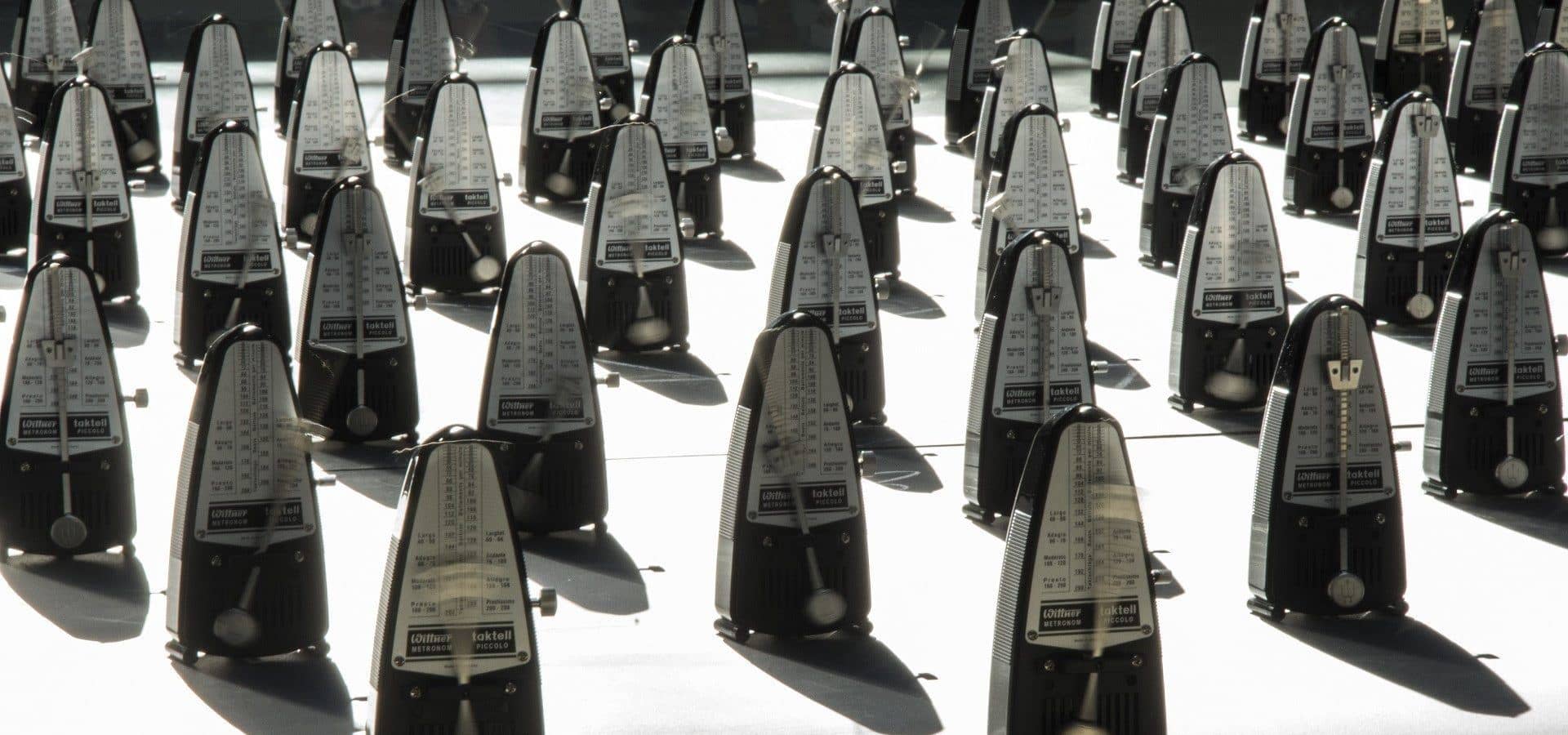Time is of the essence
Scientists, philosophers, and deep thinkers from across disciplines assembled for an unconventional gathering at Perimeter.
Take a self-guided tour from quantum to cosmos!
Scientists, philosophers, and deep thinkers from across disciplines assembled for an unconventional gathering at Perimeter.

One hundred metronomes tick-tocked in a chaotic chorus, some emitting a staccato rat-a-tat, others plodding a dirge. Collectively, they tapped out a polyrhythm that filled Perimeter’s atrium.
The performance of “Poème Symphonique,” György Ligeti’s 1962 composition for 100 metronomes, was a fitting musical interlude for Perimeter’s “Time in Cosmology” conference in June, where dozens of leading minds had gathered from fields including physics, philosophy, biology, and more.
It was a deliberately offbeat collection of voices in which the whole was greater than the sum of its parts, where lively dialogue took precedence over scholarly monologue.
At “Time in Cosmology,” lengthy presentations about recent research (the standard fare at conferences) were not welcome. Big questions were posed, answers were suggested and challenged, convivial debates were sparked.
For Lee Smolin, a Perimeter founding faculty member and co-organizer of the conference, the point was to spark new ways of thinking by eschewing the traditional ways of meeting.
“We brought together experts who have very different views to debate these questions, in an atmosphere which is tough but friendly and constructive, where we can really confront different views and may change some minds, maybe make progress on these tough questions.”
Indeed, the questions were so tough that they’ve been examined, in one form or another, for millennia. Why does time seem to only move forward? Is time fundamental to the world, or inessential? The questions transcend any single academic discipline, necessitating the diverse group of attendees.
“Every participant was carefully selected because we thought they would have a different point of view, offer something new,” said Marina Cortês, a cosmologist at the University of Edinburgh and co-organizer of the conference. “There are so many new, diverse opinions popping up all the time, it’s so beautiful. It’s a format of conference that I hope will be followed and replicated.”
For Sean Carroll, a professor of physics at the California Institute of Technology, the conference illustrated that, despite vastly different academic approaches to the question of time, common threads emerge.
“I’ve always been one who thought the interaction between philosophy and physics is absolutely crucial,” said Carroll. “The things we care about – the philosophers, the physicists – are the deepest and most foundational questions. It’s driven by pure human curiosity: how does the world actually work?”
After four days of lively discussions, the attendees did not reach a consensus about the nature of time, but no one was expecting that would happen. What did happen was that participants left with new ideas, new doubts, new collaborators, new challenges.
“And that’s what science is about,” said Carlo Rovelli, a pioneer of loop quantum gravity. “It’s about doubt, it’s not about certainty. If you keep doubting, you revise your ideas, and you get a better description of the world. That’s how science works – it’s a bubbling hot discussion that produces good science.”
In that sense, Rovelli said, the symphony of metronomes was perfectly suited to the occasion. “One has to listen carefully and see how sounds keep changing, changing, changing until the end,” he said. “You hear all these sounds – sometimes strange sounds – happening together. And that’s where it gets interesting.”
Dark Matter Night will feature live talks on October 26 at both Perimeter Institute and the McDonald Institute, webcast free online.
Nicole Yunger Halpern elaborates on a tribute to her former Perimeter Scholars International classmate woven within her new book.
In his April 7 webcast, cosmologist Will Percival will use recent galaxy survey results to explore the vastness of space.